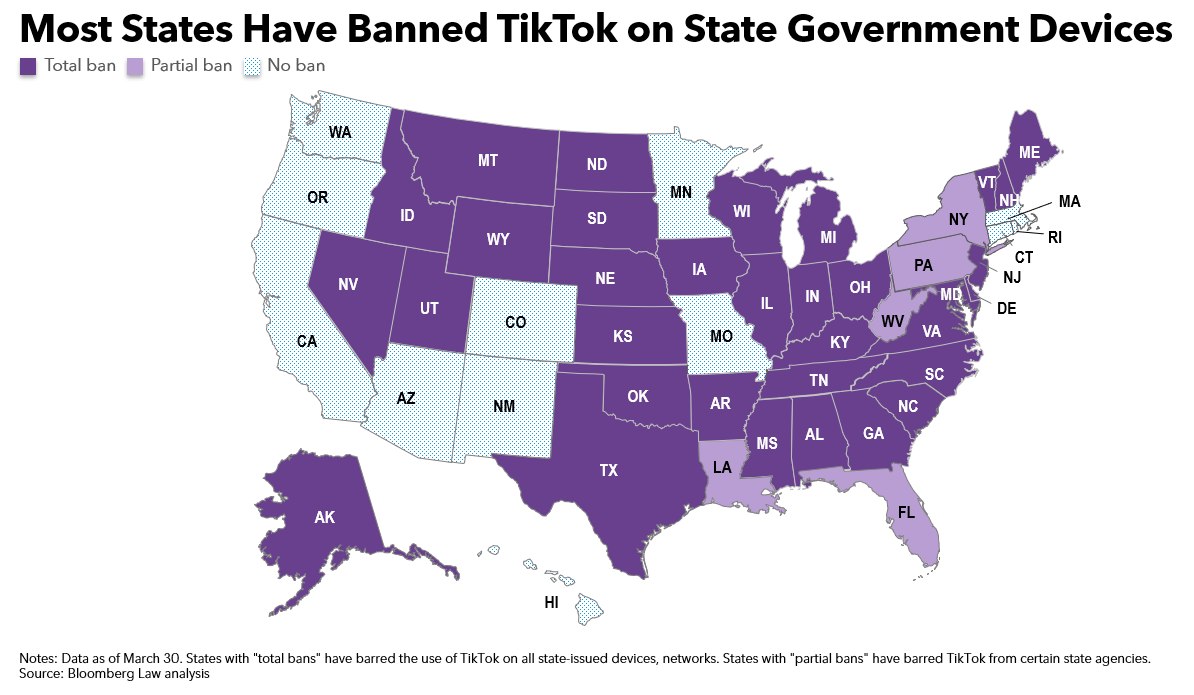Will Congress Ban TikTok?
TikTok, a video streaming social media app owned by ByteDance Ltd., is under congressional scrutiny for its alleged connections to the Chinese government. Lawmakers are moving on proposals to curb TikTok’s influence in the U.S. due to concerns over national security, privacy, and surveillance. Download the BGOV exclusive presentation-ready OnPoint.
Why do lawmakers want to ban TikTok?
Advocates of banning TikTok have primarily expressed concerns about cybersecurity risks and an adverse U.S. relationship with the Chinese government. The app is owned by Beijing-based ByteDance Ltd., which has raised questions about the Chinese government’s ability to access user data, including that of Americans. In December 2022, ByteDance disclosed that four of its employees had improperly accessed the information of some Americans’ accounts.
Lawmakers also have raised fears that TikTok’s algorithm, which decides what content users see, could be manipulated in an attempt to spread disinformation or influence public sentiment in the U.S. about certain issues.
Some states have explicitly removed the app from devices at agencies that deal with government payroll information and other sensitive financial data, though most bans apply statewide.
What federal legislation could ban TikTok?
Congress has already banned TikTok on government devices, and there are two key pieces of federal legislation currently before Congress to address broader concerns about TikTok. However, a growing number of lawmakers is speaking out against a ban, warning about the dangers of censorship and the need to focus on broader regulation.
In March 2024, The U.S. House of Representatives fast-tracked legislation that requires ByteDance to sell the popular video-sharing social media platform for the app to continue operating in the U.S. The bill passed in the House by a vote of 352 to 65, but it faces a less certain future in the Senate, where Majority Leader Chuck Schumer has so far declined to endorse it, and members including Republican Rand Paul have come out against it.
The House bill has the backing of the White House, even as President Joe Biden’s reelection campaign has started to use the platform to reach younger voters. However, former President Donald Trump reversed his previous support for a ban, posing a dilemma for Senate Republicans.
Protecting Americans from Foreign Adversary Controlled Applications Act (H.R. 7521)
-
- Prohibits internet service providers and app stores from hosting the platform unless it spins off from ByteDance within 180 days of the measure’s enactment
- Other social media apps could be subject to the same restrictions if the president determines they pose a national security risk
- Justice Department would enforce the measure, and app stores could be fined up to $5,000 per U.S. user accessing the platform after the ban
[Download the BGOV OnPoint for a ready-to-use PowerPoint with details, charts, and infographics on this issue, making it easy to report to stakeholders.]
Which states have banned TikTok?
As of May 2023, most states have banned the use of TikTok on state government devices.

How has TikTok responded?
The company has called the bans misguided and is making an effort to persuade government officials to change course.
“We’re disappointed that so many states are jumping on the political bandwagon to enact policies that will do nothing to advance cybersecurity in their states and are based on unfounded falsehoods about TikTok,” Jamal Brown, a TikTok spokesperson, told Bloomberg Law previously.
TikTok opened a transparency center at its Los Angeles headquarters, which lets visitors see how its content moderation, algorithms, and other tools work. Its plan to ease U.S. security concerns includes partnering with Oracle Corp. to store all of the social media app’s U.S. user data. A series of regular third-party audits and reviews would ensure compliance.
As bills banning TikTok gain momentum, ByteDance has ramped up its efforts to lobby in the U.S. It increased its federal lobbying tab about 66% to nearly $1.6 million during the first three months of the year when compared to the same period last year, new disclosures show.
Could this lead to other apps being banned?
Some of the state bills and executive orders focused on banning TikTok already mention other apps deemed “high-risk.” It’s possible that bans will expand to include more apps or services that are associated with U.S. adversaries.
For instance, Ohio’s executive order also banned use of Chinese-owned apps such as Weibo and WeChat on government devices. New Jersey also prohibited Russian antivirus provider Kaspersky Lab Inc.
Instead of listing specific apps, a bill in California would simply apply a ban to apps owned or controlled by “a country of concern.”[Download the BGOV OnPoint for a ready-to-use PowerPoint with details, charts, and infographics on this issue, making it easy to report to stakeholders.]